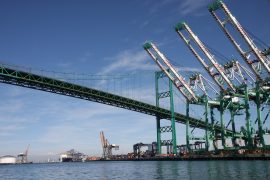The six largest US West Coast ports have sent a letter to President Donald Trump sharing their concerns about the impacts of the trade war between the US and China.
The Port of Long Beach, Port of Los Angeles, Port of Oakland, Port of Portland, Port of Seattle and Port of Tacoma said the long-term implications of the escalating trade conflict “will create irredeemable economic harm to employers, workers, residents and international partnerships along the West Coast and throughout the entire country.”
“The chaos of the current trade war is one of the most prominent risks ahead. Exporters are losing market opportunities through increased tariffs on sales to China. Changing global trade routes could mean fewer West Coast imports as supply chains shift away from China,” Stephanie Bowman, Port of Seattle commission president and co-chair of The Northwest Seaport Alliance, explained.
“A long trade war could mean more shipping time for western producers and fewer work opportunities for West Coast workers,” Clare Petrich, Port of Tacoma commission president and co-chair of The Northwest Seaport Alliance, said.
The letter reflected on the fact that 38 percent of all US exports to China by value go through the abovementioned six ports alone. The US trade policy, therefore, affects not only the port’s core businesses but also the success of their clients and the livelihoods of their local communities. What is more, thousands of jobs rely on dependable trade flows.
The letter also highlights the latest impacts related to back-and-forth tariffs between the United States and China.
California is the largest exporter to China of any state in the nation; in 2018, California ports collectively saw a decrease of about 30 percent in exports to China.
Exports to China of wheat — grown across 10 states from the Pacific Northwest to the Midwest and exported via Washington and Oregon ports on the Columbia River — have nearly ceased this year.
Similarly, The Northwest Seaport Alliance and Seattle-Tacoma International Airport exports have declined, including potatoes (-16.85%), hay (-49.93%), skins and hides (-47.89%), salmon (-47.71%), cherries (-54.56%) and fresh crab (-63.34%).
“We urge you to pursue fair, mutually beneficial trade agreements that open new market access opportunities, create a level playing field for America businesses, and protect our workers and the environment,” the letter concludes.
Source: http://worldmaritimenews.com


